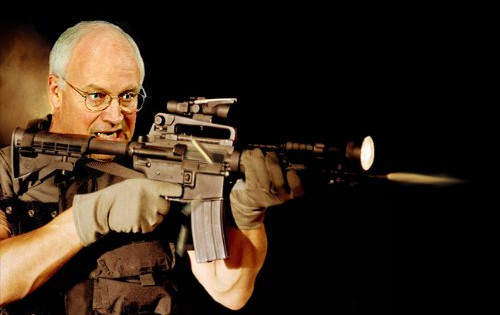

What does it mean to be modern? What is this modern world we find ourselves in? What does the future hold?
What do we make of seeing a woman in a burka walking down the street of a metropolitan area? The Muslim bee-keeper suit which keeps women from being seen. Those who preach tolerance might tell us that the burka is not a walking prison but a choice. Though many women are forced to conceal themselves by their brothers and fathers, others conceivably choose to wear the get-up.
Some would argue that the burka is no different than the necktie, an article of clothing which bears a meaning for the wearer and the public. This, ostensibly, is protected by the 1st ammendment. Clothing as a means of self expression.
But what if I were to walk naked into the Capitol Building? Could I claim that my certain arrest was a sign of intolerance? Doesn't society need to manage moral diversity by setting some cultural norms with the force of law? Does not the same logic that keeps my cock in my pants, justify laws against burkas?
Modernity? There is the argument that Islamic fundamentalists are just as modern as us, by virtue of living in the twenty-first century. They worship one Ancient text (the Koran) and we follow another (the Declarations of Independence and the Constitution).
But where their text is a superstition - a story - our text is a good faith attempt at reason. Is modernity another word for a technocratic age governed by science and reason? Or are we just updating our delusions, trading our tattered old dogmas in for newer ones.
How are WE modern in a way THEY are not? Only insofar as modernity involves an obsession with evidence.
Where the premodern are satisfied by the claims of authority, myth and superstition, the modern demand evidence. The modern is characterized by a hunger for visibilty. The modern human says "show me!"

The Ku Klux Klan triggered many communities in the US to pass laws that said you could not wear a mask while protesting or otherwise making political demands.
Despite the enormous risks, Iraqi translators working in are military are told not to wear a mask while they work, because we belive that this is inconsistent with the ideal of creating an open society.
Somewhere in the character of democracy is a demand that we take off our masks and allow ourselves to be seen. Modernity asks us to remove our veils, to emerge as individuals from behind traditional group identities. Modernity asks that we liberate ourselves from the cages of religon and family tradition. As suggested by theorists like Jon Laramore, if we can broaden our moral personalities enough to take on some differentiation between our roles as private and public actors, then we can find some way to compartmentalize our different loyalties. Christianity, unitl recently, has been marked by its ability to coexist with republican virtues by its tendency to accept boundaries between the personal and the political. If we fail in doing this, and we fail at persuading our fellow citizens to tolerate our differences, then as John Rawls suggested, the state has legitimate means to keep your privates our of the public. Don't walk by the playground naked or in your burka, at least not in my neighborhood. Cover up your private parts and show us your public parts!
Perhaps I am offering up an ideal of modernity, when in reality there are multiple modernities. Honestly, anyone wearing a burka in 2010 is just as modern as I am. But theirs is part of a troubling new strain of modernity. A backlash to globalization and the visual-reason based modernity I mentioned earlier, this parallel modernity involves fragmented, factional identities. The tribal and the superstitious take on a legitimacy more powerful than that offered by sight and science.
This is a disturbing trend. As a democratic citizen of America and the world, I implore you, take off your masks, look critically on your parent's superstitions. Show your face.


Very good argument. I think that insofar as burkas are concerned, most of Western society often feels not only uncomfortable, but unsafe with large numbers of people going about their daily lives wearing 'masks.'
ReplyDeleteSomething to think about might be protesters ( often anarchists) who cover their faces because...well I'm not exactly sure why, but they do it. If wearing the burka now became a sign of protest against intolerance towards Muslim women, it could change the argument.
I'd also like to hear your opinion on the ban on minarets in Switzerland.
This comment has been removed by the author.
ReplyDeletemodernity is contemporary, contemporary is temporary, traditions stick around a bit longer; especially the ones that will result in death upon abatement.
ReplyDeleteas for these burqas, i think i've gotten to the bottom of this... i think i've found what these "muslim women" have been hiding from us all:
http://www.youtube.com/watch?v=tV5wmDhzgY8&feature=related
It might be fun for women to walk around in burkas with strap ons or some such sexual thing hitched to the front, and make the symbol undesirable as a symbol of purity.
ReplyDeleteThen again, I just like to stir up trouble.